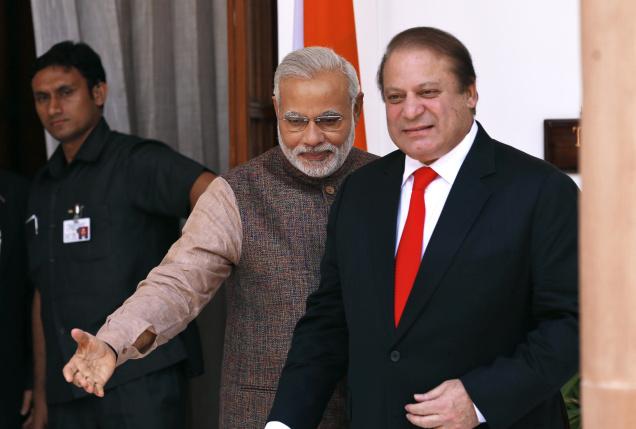India-Pakistan to Resume Talks
Prime Minister Narendra Modi and his Pakistani counterpart Nawaz Sharif

NEW DELHI: Indian Foreign Secretary, S Jaishankar, is set to visit Islamabad March 3, according to Pakistan’s Foreign Office. "Pursuant to Prime Minister Modi's call to Premier Nawaz Sharif on 13 February, 2015, Indian Foreign Secretary Mr S. Jaishankar would visit Pakistan on 3-4 March, 2015," Pakistani FO spokesperson Tasneem Aslam said, adding that "during his visit, Mr Jaishankar would hold a meeting with Foreign Secretary Mr Aizaz Ahmad Chaudhry."
The confirmed dates follow a telephone conversation between Indian Prime Minister Narendra Modi and his Pakistani counterpart Nawaz Sharif. PM Modi has called leaders of South Asian Association of Regional Cooperation (SAARC) countries to wish them luck for the upcoming cricket World Cup, including, in addition to Sharif, Afghan President Ashraf Ghani, Bangladesh Prime Minister Sheikh Hasina, and newly-sworn in Sri Lanka President Maithripala Sirisena.
On Twitter, PM Modi, whilst wishing SAARC nations good luck, had said that India’s Foreign Secretary will soon be setting off on a “SAARC-yatra” to promote ties.
India’s Ministry of External Affairs (MEA) spokesperson, Syed Akbaruddin, confirmed the visit at a briefing. “The foreign secretary will visit all SAARC countries including Pakistan," Akbaruddin told reporters without providing additional details.
In a Q&A session of Facebook, the MEA spokesperson, responding to a question on the visit, said, “We stand ready to talk with Pakistan in accordance with the Simla Agreement on all issues, including Jammu and Kashmir.”
The visit is significant because India had cancelled secretary-level talks -- that had been agreed to during Sharif’s visit for PM Modi’s inauguration ceremony -- over Pakistan’s decision to meet Kashmiri separatist leaders in August last year. Speaking at the United Nations last month, Sharif said that India’s decision to cancel the talks had resulted in a “missed opportunity.” Modi, speaking at the UN the next day, responded saying that India was not opposed to talks, but would not participate “in the shadow of terror” and that it was upto Pakistan to “create a conducive atmosphere for talks.”
Further, tensions between the two countries have been high as border skirmishes across the Line of Control that began in late 2014, continued in 2015. The firing prompted Pakistan penning a letter to UN Secretary General Ban Ki Moon that invoked the UN to implement resolutions for a plebiscite in Kashmir. The letter marked a major reversal of Pakistan’s position for over a decade, sending bilateral relations between the two countries plummeting.
However, the first sign that the situation was changing came when Pakistan’s former National Security Adviser Major-General (Retd.) Mahmud Durrani met with NSA Ajit Doval and Foreign Secretary S. Jaishankar earlier this month. The Citizen had the reported that the meeting could be an attempt at resuming back channel diplomacy. Although the MEA spokesperson dismissed a question in regard to whether this could pave the way for the resumption of an India-Pakistan dialogue, General Durrani was quoted by The Hindu saying that his impression is that Prime Minister Narendra Modi would “like to move forward” on the dialogue, but would rather not pick up the old format of the composite dialogue process. “Mr. Modi is a different man with a different mind and a different thinking from the previous Prime Minister,” The Hindu quoted General Durrani as saying. “I think he will probably engage with Pakistan, but he would like to do that in his own way.”



